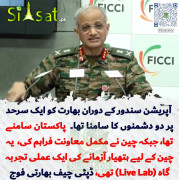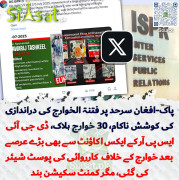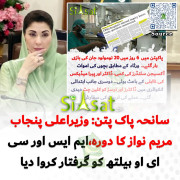C
commander
Guest
SC verdict in focus
http://www.thenews.com.pk/top_story_detail.asp?Id=24794
Friday, October 02, 2009
Can legitimicay flow from gun, judge asks
By Tariq Butt
ISLAMABAD: There can be no rational basis for decrying the assault on the writ of the State by any band of marauders, robbers, adventurers and zealots of varying extremes in the political spectrum, if reliance on coercive force in gaining power is legitimised or condoned, one of the 13 judges wrote in his separate note, which is part of the just released detailed Supreme Court judgement.
These elements undoubtedly will thus be encouraged in adopting similar use of arms and violence to force their ideological creeds on the people of Pakistan, Justice Jawwad S Khawaja wrote in his 1180-word note on the Nov 3, 2007 action of Pervez Musharraf in his capacity of the chief of the army staff.
In his opinion, the whole case before the court can be reduced to one foundational question: Can constitutional legitimacy flow from the force of arms or as is more graphically put at times from the barrel of a gun?
This is the basic issue here because Musharraf, on Nov 3, 2007, took actions in his capacity as army chief (and then purportedly, as president) without the slightest pretence that these were permitted to him by the Constitution, the note said.
The judge wrote that it was not the apex court to embark on a discussion on questions, not directly arising in this case. It would, however, be for the representatives of the people and for all thinking people to determine if the absence of the rule of law within the upper echelons and formal structures of the State has, in a significant way, generated the lawlessness, which so permeates our society today. I can only venture to say that the causal connection very strongly suggests itself.
Justice Khawaja wrote that at two places in a letter addressed by the then Prime Minister of Pakistan, Shaukat Aziz, to President, General Pervez Musharraf, reproduced in the main judgement, the term writ of the government has been used and interference with this writ by the judiciary has been criticised.
It is a measure of the abysmal lack of understanding of constitutional rule on the part of the then prime minister and president that the distinction between the writ of the government and the writ of the State has not been recognised by them. It is the writ of the State which has to be enforced and not the writ of the government because the government represents only the executive organ of the State and in that capacity it can and must be checked by the judiciary if it starts acting in violation of the Constitution.
The judge noted that the wholly specious and untenable reasoning in the prime ministers letter was used by Musharraf with the sole object of launching an unashamed attack on the Constitution and in particular on the judicial organ of the State. On Nov 3, with utter disdain for the Constitution and in a manner, which was brazenly imperious, Musharraf arrogated on himself the right to decide what was good for the people of Pakistan and the manner in which they ought to be governed.
Justice Khawaja wrote that this was an anachronistic throwback to the notion (discredited in all civilized dispensations). Surely, as President of Pakistan, Musharraf cannot be presumed to have been ignorant of the Constitution. The people of Pakistan have consciously chosen the method for their own governance. The Constitution is a document, which at a conscious level records, in classical terms, the social contract between the people and those who they choose to entrust with the governance of the State, he said.
The note said that the abuse of the army chiefs office by Musharraf, lacking legitimate authority, constituted a frontal attack on the Constitution and directly undermined the writ of the State. It is only through the unremitting struggle by the people for their right to be governed in accordance with the Constitution that the assault on their guaranteed rights, was thwarted, he said.
The judge further wrote that in the light of the preamble to the Constitution, it was nothing but haughty arrogance on Musharrafs part to claim to be above the Constitution and to assume the power of arbitrarily amending it. Even if the concept of salus populi (good of people) and the best interest of the people were to be invoked, it would inevitably demand adherence to the Constitution because ignoring it necessarily implies the conceited notion that the people of Pakistan who had chosen their own method of governance were incapable of knowing what was best for them.
Fortunately for the people of Pakistan, the troubled events starting on March 9, 2007 enabled them to see behind the false face and deceptive veneer of an essentially anti-people dispensation, the judge wrote and added that these events also enabled the people to realize, what heretofore had been mere rhetoric, viz. that they were the sarchashma (fountain-head) of power.
http://www.thenews.com.pk/top_story_detail.asp?Id=24794
Friday, October 02, 2009
Can legitimicay flow from gun, judge asks
By Tariq Butt
ISLAMABAD: There can be no rational basis for decrying the assault on the writ of the State by any band of marauders, robbers, adventurers and zealots of varying extremes in the political spectrum, if reliance on coercive force in gaining power is legitimised or condoned, one of the 13 judges wrote in his separate note, which is part of the just released detailed Supreme Court judgement.
These elements undoubtedly will thus be encouraged in adopting similar use of arms and violence to force their ideological creeds on the people of Pakistan, Justice Jawwad S Khawaja wrote in his 1180-word note on the Nov 3, 2007 action of Pervez Musharraf in his capacity of the chief of the army staff.
In his opinion, the whole case before the court can be reduced to one foundational question: Can constitutional legitimacy flow from the force of arms or as is more graphically put at times from the barrel of a gun?
This is the basic issue here because Musharraf, on Nov 3, 2007, took actions in his capacity as army chief (and then purportedly, as president) without the slightest pretence that these were permitted to him by the Constitution, the note said.
The judge wrote that it was not the apex court to embark on a discussion on questions, not directly arising in this case. It would, however, be for the representatives of the people and for all thinking people to determine if the absence of the rule of law within the upper echelons and formal structures of the State has, in a significant way, generated the lawlessness, which so permeates our society today. I can only venture to say that the causal connection very strongly suggests itself.
Justice Khawaja wrote that at two places in a letter addressed by the then Prime Minister of Pakistan, Shaukat Aziz, to President, General Pervez Musharraf, reproduced in the main judgement, the term writ of the government has been used and interference with this writ by the judiciary has been criticised.
It is a measure of the abysmal lack of understanding of constitutional rule on the part of the then prime minister and president that the distinction between the writ of the government and the writ of the State has not been recognised by them. It is the writ of the State which has to be enforced and not the writ of the government because the government represents only the executive organ of the State and in that capacity it can and must be checked by the judiciary if it starts acting in violation of the Constitution.
The judge noted that the wholly specious and untenable reasoning in the prime ministers letter was used by Musharraf with the sole object of launching an unashamed attack on the Constitution and in particular on the judicial organ of the State. On Nov 3, with utter disdain for the Constitution and in a manner, which was brazenly imperious, Musharraf arrogated on himself the right to decide what was good for the people of Pakistan and the manner in which they ought to be governed.
Justice Khawaja wrote that this was an anachronistic throwback to the notion (discredited in all civilized dispensations). Surely, as President of Pakistan, Musharraf cannot be presumed to have been ignorant of the Constitution. The people of Pakistan have consciously chosen the method for their own governance. The Constitution is a document, which at a conscious level records, in classical terms, the social contract between the people and those who they choose to entrust with the governance of the State, he said.
The note said that the abuse of the army chiefs office by Musharraf, lacking legitimate authority, constituted a frontal attack on the Constitution and directly undermined the writ of the State. It is only through the unremitting struggle by the people for their right to be governed in accordance with the Constitution that the assault on their guaranteed rights, was thwarted, he said.
The judge further wrote that in the light of the preamble to the Constitution, it was nothing but haughty arrogance on Musharrafs part to claim to be above the Constitution and to assume the power of arbitrarily amending it. Even if the concept of salus populi (good of people) and the best interest of the people were to be invoked, it would inevitably demand adherence to the Constitution because ignoring it necessarily implies the conceited notion that the people of Pakistan who had chosen their own method of governance were incapable of knowing what was best for them.
Fortunately for the people of Pakistan, the troubled events starting on March 9, 2007 enabled them to see behind the false face and deceptive veneer of an essentially anti-people dispensation, the judge wrote and added that these events also enabled the people to realize, what heretofore had been mere rhetoric, viz. that they were the sarchashma (fountain-head) of power.






































